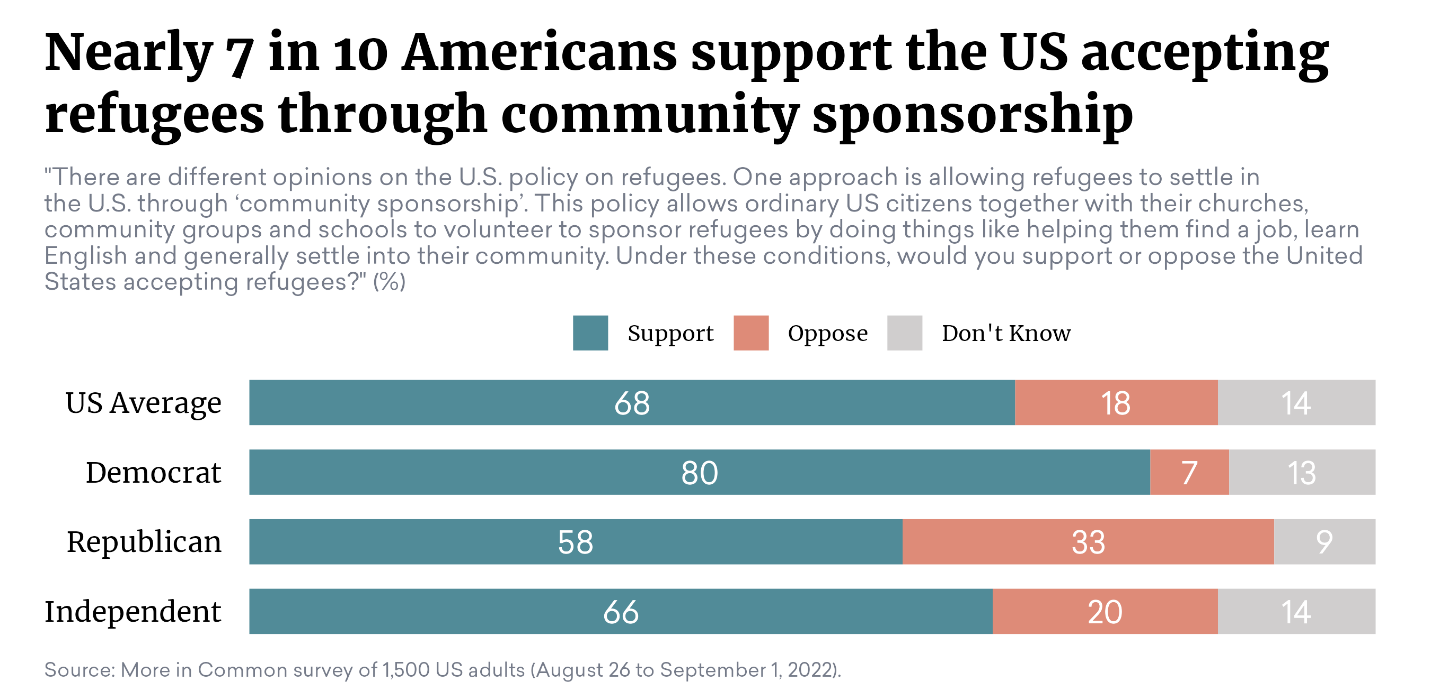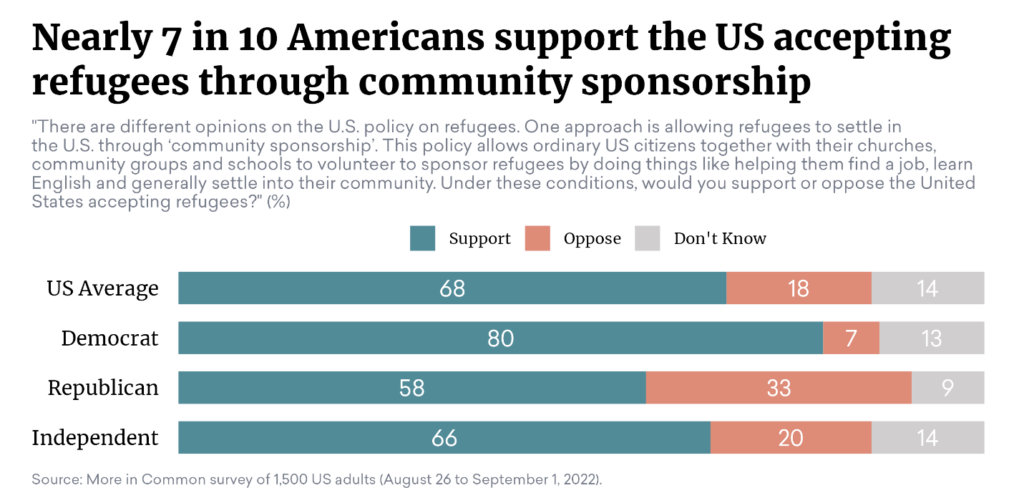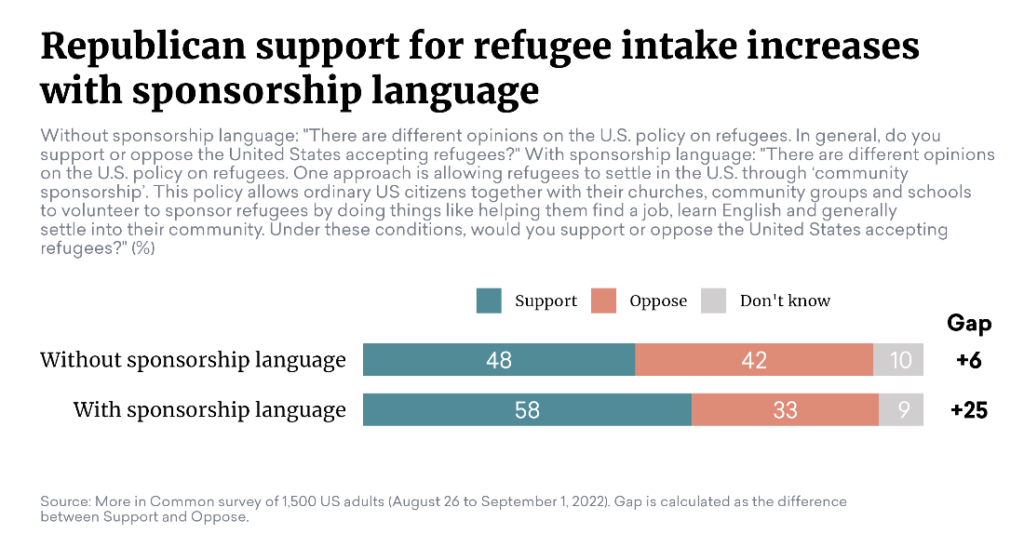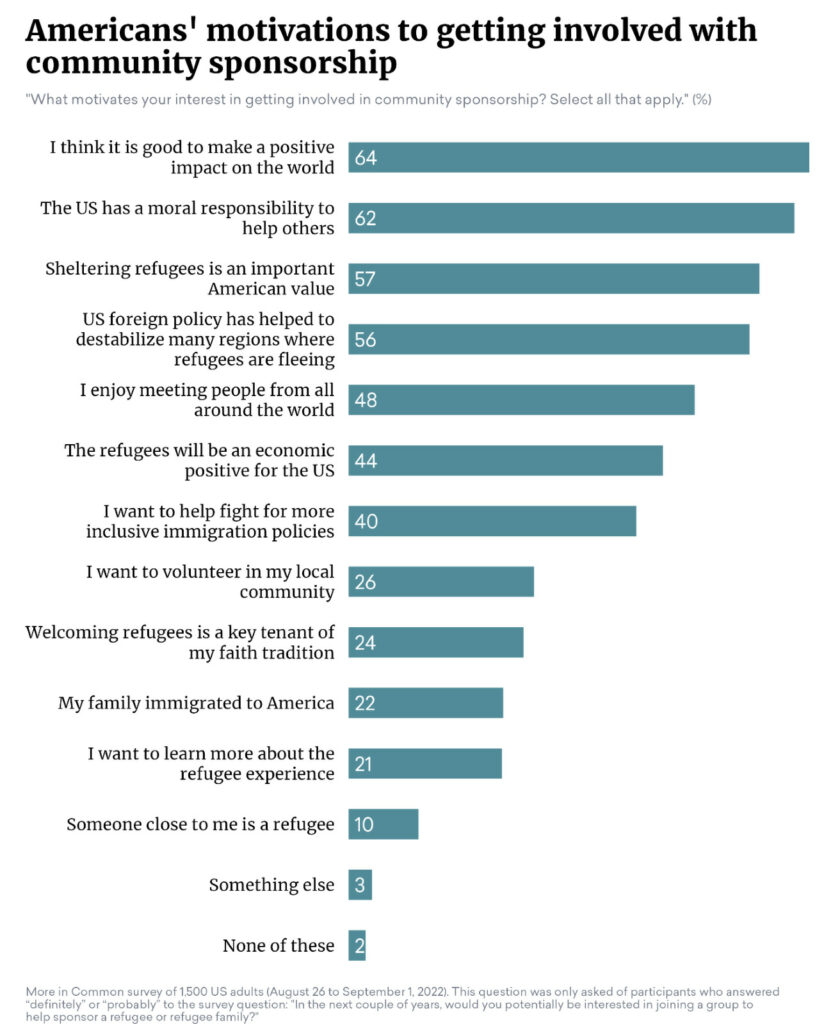June 21, 2023
“I feel so filled up! … A joy… that I have not experienced with anything else!”
More in Common US

Summary: Refugee sponsorship – which taps into the goodwill of local communities across the country – brings a transformation not just in the lives of refugees but also their American sponsors. More in Common is partnering with sponsor networks across the US and Europe to provide insights to better understand public attitudes and motivations to welcome newcomers into our communities.
For generations, people fleeing persecution and war have looked to the United States for sanctuary. Familiar images of Americans welcoming newcomers have again been seen in many places during the past two years, with the arrival of families from Ukraine and Afghanistan. But behind those images are the most far-reaching changes in refugee policies since 1980, when the modern resettlement program was established.
The changes now taking place are tapping into the goodwill of American communities in ways that have never been done on such a large scale before. This is making it possible for refugees to integrate more quickly and helping to strengthen public support and engagement in welcoming refugees. In less than two years, communities across the country have welcomed more than 125,000 people fleeing the war in Ukraine and more than 76,000 people escaping the Taliban’s seizure of power in Afghanistan. These numbers would never have been possible without a huge surge in voluntary efforts across the nation.
More in Common is working in partnership with networks of national, state and local organizations across the US to provide deeper insights into public attitudes and to help sponsorship networks grow and engage their local communities. Our research has found strong public support for welcoming these and other newcomers, widespread interest in taking part as welcomers, and provides valuable insights into the factors shaping Americans’ perceptions of refugee policy.
What is community sponsorship?
In recent years the US government launched a series of emergency sponsorship initiatives, inviting everyday Americans to support newcomers in response to the crises in Afghanistan and Ukraine – and more recently Cuba, Haiti, Nicaragua and Venezuela. The origins of this model are from Canada, which established community sponsorship (also known as ‘private sponsorship’) in 1979, in response to refugees fleeing Cambodia, Laos and Vietnam.
Under the programs recently launched in the US, regular Americans volunteer (usually in small groups) to help refugee families settle upon arrival into an American town, suburb or city. From welcoming them at the airport to helping them find work, schools, housing and community connections, sponsors provide newcomers with the information and tools needed to begin their life in the United States. While local communities have always been able to play a role in supporting refugees, this approach puts them at the center – a change from the traditional reliance on specialist nonprofit agencies providing resettlement and integration services.
In January of this year, Secretary of State Anthony J. Blinken announced the establishment of Welcome Corps, a permanent new program of private refugee sponsorship. The US now joins a group of over ten countries globally who are testing and scaling up community-based sponsorship models. More in Common is helping the consortium of organizations tasked to build this new program.
Refugee community sponsorship has broad public appeal
More in Common seeks to focus our efforts where evidence points to the greatest potential impact. We are investing time and energy in community sponsorship because of a striking finding that has been repeated across time and countries: the public has significantly more confidence in a refugee system that puts local communities at its center. In total, an overwhelming 68 percent of Americans support the US accepting refugees through community sponsorship, with just 18 percent of Americans opposed.

Notably, sponsorship increases support most among voter groups who are usually less supportive of welcoming refugees, a pattern that we have also seen in other nations. While the Trump Administration reduced America’s annual intake of refugees from 85,000 in 2016 to under 12,000 in 2020, our research finds that a clear majority of Republican voters support refugee sponsorship. Sponsorship increases the level of Republican support for accepting refugees from 48 to 58 percent, and reduces opposition from 42 percent to 33 percent.

We asked Americans two versions of the question “Do you support or oppose the US accepting refugees?” One version did not include any mention of community sponsorship, and another included a brief explanation.
Why do Americans have more confidence in welcoming refugees when sponsorship programs are in place?
Our research suggests it is because most people hold mixed views about immigration and refugees – but sponsorship addresses many of their concerns. Newcomers are much more likely to find work, learn English and integrate into communities if they are actively supported by local networks. People perceive sponsorship as a more orderly and less risky approach, and they are more likely to trust a grassroots-driven program than something that feels more top-down and imposed by government.
A key insight from social psychology is that our minds naturally categorize ourselves and others as belonging to in-groups and out-groups (‘us’ versus ‘them’), which deeply shapes social interactions and biases. The more that people feel insecure or threatened, the more they get anxious about people who belong to their out-group.
Refugee sponsorship can be a powerful model as it helps refugees better integrate into communities and enables people to see them not as “the other” but as people like “us” – breaking down the us-versus-them dynamics. Sponsorship also broadens responsibility for integration and financial support to local communities, who are often more trusted than governments.
“Our mission at Welcome.US is to bring communities together across divides to help welcome newcomers and ensure they thrive–and in doing so, rebuild our collective identity and commitment to welcoming, so that as a nation we can welcome many more. More in Common’s insights about how best to bring people from across our American tapestry into welcoming work have been essential to achieving this goal – and we are so inspired by how many Americans are participating.”
– Nazanin Ash, Chief Executive Officer, Welcome.US
1 in 4 Americans are interested in helping sponsor refugees
Our research has found that one in four American adults are interested in playing a role in community sponsorships in the next couple of years, meaning more than 50 million adult Americans are potential sponsors. They come from all walks of life: from groups of friends in their 20s to retirees; committed believers to secular Americans; Republicans and Democrats; people with strong political views, and many with no interest in politics at all. More than anything else, Americans are motivated to get involved in sponsoring refugee families because they want to make a positive impact in the world.

In addition to seeing what Americans are interested in community sponsorship, we also spoke with Americans who have or are sponsoring newcomers about their experiences and motivations. Many spoke about how their lives changed in ways they never expected and rich, new relationships developed with neighbors, newcomers, and their local community (reflected in the Welcome Corps’ logo: ‘Sponsoring Refugees. Strengthening Communities’). Christian faith was a key motivation for some; for others, it was their sense of responsibility as Americans; and many spoke of the powerful experience of having a direct, positive effect on people whose lives have been turned upside down by war.
What sponsors are saying about the experience:
“I feel so filled up with joy about the experience—I think it’s because of that sense of accomplishing something and actually watching it happen and grow.” – Rosanne is a current volunteer sponsor in Ohio who has helped welcome a Ukrainian family through her church.
“When you have shared experiences with people, then you build connections.” – Julie is a current volunteer sponsor in Maryland who has helped welcome an Afghan family through her synagogue.
What’s next
A key lesson from Canada’s successful sponsorship program is that over time, sponsorship brings millions of people into direct contact with refugee families – overcoming barriers, deepening understanding, and helping build a more cohesive society. For a divided America, those benefits cannot come soon enough. The good news is that these positive effects are already emerging across America, with powerful stories from everyday life being shared between family, friends and neighbors – stories of hope amidst despair, and meaningful connection in a world of so much disconnection.
This issue is also not unique to North America. More in Common’s global teams are also partnering with the Global Refugee Sponsorship Initiative and networks in Germany, the United Kingdom and across Europe, helping with the design and rollout of new community-based programs to welcome and integrate refugees. Similar to our findings in the US, they have found broad support among Germans and Britons for community sponsorship programs and have been uncovering powerful stories of transformation for those who engage with them.
The global system for protecting refugees is under huge strain, with too few places to provide shelter and security for the world’s 35 million refugees. Community sponsorship is one of the most positive innovations taking place in this system, benefiting both refugee families and local communities. Sponsorship models offer a way to transcend debates that are too often polarized, by both protecting more people in need and strengthening local communities. We look forward to continuing to help support these initiatives in the US and across the world.
For more information about More in Common’s work on refugee sponsorship and public attitudes please contact Julia Coffin at Julia@moreincommon.com.
Methodology
More in Common partnered with international polling company YouGov to conduct online survey interviews with n=1,500 adult US citizens from August 26 to September 1, 2022. Additionally, in February and April 2023, More in Common conducted a series of 9 focus groups with volunteers from sponsor circles in the United States who welcomed either Afghan or Ukrainian newcomers. These conversations were an opportunity to probe on volunteer’s experiences helping to sponsor newcomers, including what motivates their participation, highlights of their experience, any challenges encountered and their hopes for the future of sponsorship in the United States.